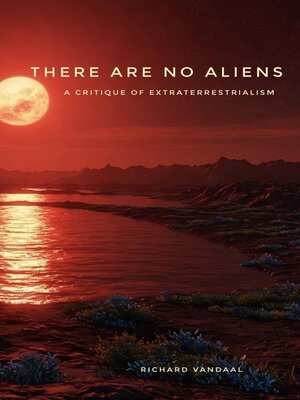
Sign up to save your library
With an OverDrive account, you can save your favorite libraries for at-a-glance information about availability. Find out more about OverDrive accounts.
Find this title in Libby, the library reading app by OverDrive.



Search for a digital library with this title
Title found at these libraries:
| Library Name | Distance |
|---|---|
| Loading... |
"There are No Aliens: A Critique of Extraterrestrialism" challenges how we conceptualize extraterrestrial intelligence, arguing that our vision of potential cosmic companions remains profoundly shaped by human cognitive architecture and cultural frameworks rather than representing genuine openness to cosmic otherness.
The book systematically examines anthropocentrism across multiple dimensions: scientific methodologies that privilege Earth-like biology, probability calculations that transform limited data into seemingly rigorous predictions, and technological projections that extend industrial capitalist values onto cosmic scales. It analyzes physical constraints on interstellar travel, limitations of religious frameworks, and epistemological barriers to recognizing intelligence unlike our own.
Cultural analysis reveals how aliens function primarily as psychological projections—screens for processing human anxieties about technology, otherness, and social change—telling us more about ourselves than about what might exist beyond Earth.
Importantly, the book doesn't deny the possibility of extraterrestrial intelligence or discourage the search. Rather, it recognizes the conceptual constraints limiting our cosmic imagination while developing more sophisticated approaches characterized by epistemological humility—acknowledging human limitations while reaching beyond them where possible.
The book explores alternative frameworks that might transcend conventional thinking, from object-oriented ontology to indigenous cosmologies to quantum consciousness theories. It proposes methodological reforms including agnostic biosignature research, multiple working hypotheses, anomaly-focused observation, and algorithmic approaches to pattern recognition that might detect organizations beyond human cognitive biases.
Ultimately, "There are No Aliens" suggests that sophisticated extraterrestrialist thinking may not provide definitive answers about alien existence but more nuanced questions about cosmic reality—questions acknowledging both the possibilities and limitations of human cosmic comprehension while remaining open to what might exist beyond current understanding.
The alien remains simultaneously a projection of human consciousness and a genuine possibility beyond human experience—both mirror and mystery. By recognizing how our conception of cosmic others is shaped by human experience while remaining open to possibilities beyond it, we might develop more sophisticated approaches to whether we share the cosmos with other intelligences.







